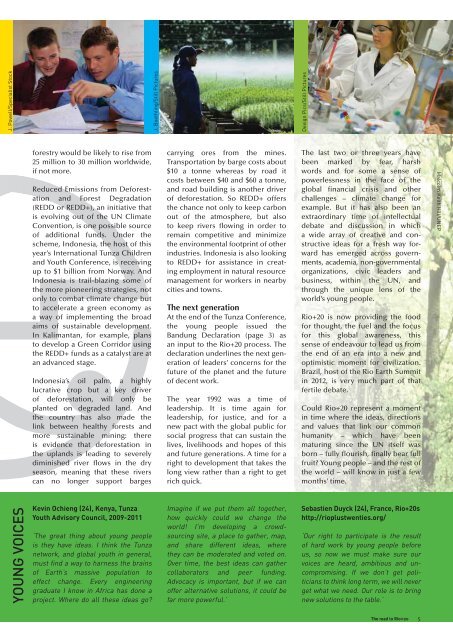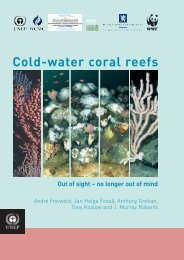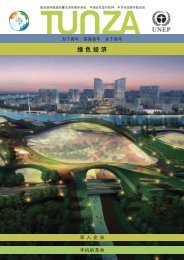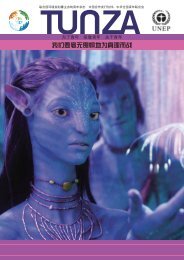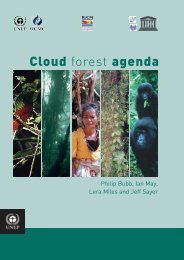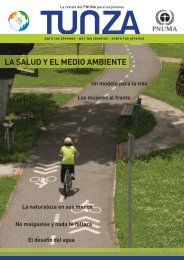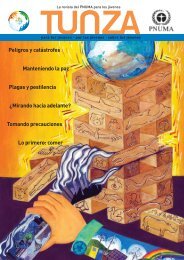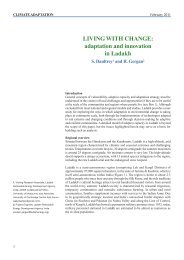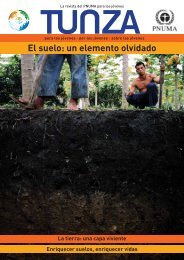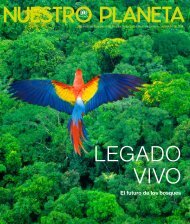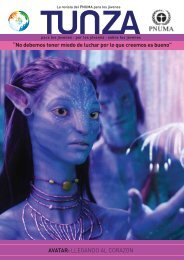Tunza Vol. 9.3: The road to Rio+20 - UNEP
Tunza Vol. 9.3: The road to Rio+20 - UNEP
Tunza Vol. 9.3: The road to Rio+20 - UNEP
You also want an ePaper? Increase the reach of your titles
YUMPU automatically turns print PDFs into web optimized ePapers that Google loves.
J. Powell/Specialist S<strong>to</strong>ck<br />
J. Boethling/Still Pictures<br />
Design Pics/Still Pictures<br />
forestry would be likely <strong>to</strong> rise from<br />
25 million <strong>to</strong> 30 million worldwide,<br />
if not more.<br />
Reduced Emissions from Deforestation<br />
and Forest Degradation<br />
(REDD or REDD+), an initiative that<br />
is evolving out of the UN Climate<br />
Convention, is one possible source<br />
of additional funds. Under the<br />
scheme, Indonesia, the host of this<br />
year’s International <strong>Tunza</strong> Children<br />
and Youth Conference, is receiving<br />
up <strong>to</strong> $1 billion from Norway. And<br />
Indonesia is trail-blazing some of<br />
the more pioneering strategies, not<br />
only <strong>to</strong> combat climate change but<br />
<strong>to</strong> accelerate a green economy as<br />
a way of implementing the b<strong>road</strong><br />
aims of sustainable development.<br />
In Kalimantan, for example, plans<br />
<strong>to</strong> develop a Green Corridor using<br />
the REDD+ funds as a catalyst are at<br />
an advanced stage.<br />
Indonesia’s oil palm, a highly<br />
lucra tive crop but a key driver<br />
of deforestation, will only be<br />
planted on degraded land. And<br />
the country has also made the<br />
link between healthy forests and<br />
more sustainable mining: there<br />
is evidence that deforestation in<br />
the uplands is leading <strong>to</strong> severely<br />
diminished river flows in the dry<br />
season, meaning that these rivers<br />
can no longer sup port barges<br />
carry ing ores from the mines.<br />
Transportation by barge costs about<br />
$10 a <strong>to</strong>nne whereas by <strong>road</strong> it<br />
costs between $40 and $60 a <strong>to</strong>nne,<br />
and <strong>road</strong> building is another driver<br />
of deforestation. So REDD+ offers<br />
the chance not only <strong>to</strong> keep carbon<br />
out of the atmosphere, but also<br />
<strong>to</strong> keep rivers flowing in order <strong>to</strong><br />
remain competitive and minimize<br />
the environmental footprint of other<br />
industries. Indonesia is also look ing<br />
<strong>to</strong> REDD+ for assistance in creating<br />
employment in natural resource<br />
management for workers in nearby<br />
cities and <strong>to</strong>wns.<br />
<strong>The</strong> next generation<br />
At the end of the <strong>Tunza</strong> Conference,<br />
the young people issued the<br />
Bandung Declaration (page 3) as<br />
an input <strong>to</strong> the <strong>Rio+20</strong> process. <strong>The</strong><br />
declaration underlines the next generation<br />
of leaders’ concerns for the<br />
future of the planet and the future<br />
of decent work.<br />
<strong>The</strong> year 1992 was a time of<br />
lead ership. It is time again for<br />
leadership, for justice, and for a<br />
new pact with the global public for<br />
social progress that can sustain the<br />
lives, livelihoods and hopes of this<br />
and future generations. A time for a<br />
right <strong>to</strong> development that takes the<br />
long view rather than a right <strong>to</strong> get<br />
rich quick.<br />
<strong>The</strong> last two or three years have<br />
been marked by fear, harsh<br />
words and for some a sense of<br />
powerlessness in the face of the<br />
global financial crisis and other<br />
challenges – climate change for<br />
example. But it has also been an<br />
extraordinary time of intellectual<br />
debate and discussion in which<br />
a wide array of creative and constructive<br />
ideas for a fresh way forward<br />
has emerged across gov ernments,<br />
academia, non-govern mental<br />
organizations, civic leaders and<br />
business, within the UN, and<br />
through the unique lens of the<br />
world’s young people.<br />
<strong>Rio+20</strong> is now providing the food<br />
for thought, the fuel and the focus<br />
for this global awareness, this<br />
sense of endeavour <strong>to</strong> lead us from<br />
the end of an era in<strong>to</strong> a new and<br />
optimistic moment for civilization.<br />
Brazil, host of the Rio Earth Summit<br />
in 2012, is very much part of that<br />
fertile debate.<br />
Could <strong>Rio+20</strong> represent a moment<br />
in time where the ideas, directions<br />
and values that link our common<br />
humanity – which have been<br />
maturing since the UN itself was<br />
born – fully flourish, finally bear full<br />
fruit? Young people – and the rest of<br />
the world – will know in just a few<br />
months’ time.<br />
Malcolm Keith Hill/<strong>UNEP</strong><br />
YOUNG VOICES<br />
Kevin Ochieng (24), Kenya, <strong>Tunza</strong><br />
Youth Advisory Council, 2009-2011<br />
‘<strong>The</strong> great thing about young people<br />
is they have ideas. I think the <strong>Tunza</strong><br />
network, and global youth in general,<br />
must find a way <strong>to</strong> harness the brains<br />
of Earth’s massive population <strong>to</strong><br />
effect change. Every engineering<br />
grad uate I know in Africa has done a<br />
project. Where do all these ideas go?<br />
Imagine if we put them all <strong>to</strong>gether,<br />
how quickly could we change the<br />
world! I’m developing a crowdsourcing<br />
site, a place <strong>to</strong> gather, map,<br />
and share different ideas, where<br />
they can be moderated and voted on.<br />
Over time, the best ideas can gather<br />
collabora<strong>to</strong>rs and peer funding.<br />
Advocacy is important, but if we can<br />
offer alternative solutions, it could be<br />
far more powerful.’<br />
Sebastien Duyck (24), France, <strong>Rio+20</strong>s<br />
http://rioplustwenties.org/<br />
‘Our right <strong>to</strong> participate is the result<br />
of hard work by young people before<br />
us, so now we must make sure our<br />
voices are heard, ambitious and uncompromising.<br />
If we don’t get politicians<br />
<strong>to</strong> think long term, we will never<br />
get what we need. Our role is <strong>to</strong> bring<br />
new solutions <strong>to</strong> the table.’<br />
<strong>The</strong> <strong>road</strong> <strong>to</strong> <strong>Rio+20</strong><br />
5


